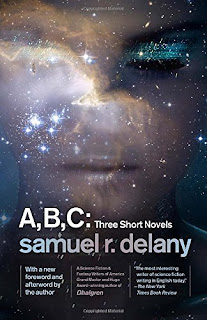Delany is having a busy month with a new edition of three early novels and a homage anthology. So, he's giving more interviews.
In the contemporary science-fiction scene, Delany’s race and sexuality do not set him apart as starkly as they once did. I suggested to him that it was particularly disappointing to see the kind of division represented by the Sad Puppies movement within a culture where marginalized people have often found acceptance. Delany countered that the current Hugo debacle has nothing to do with science fiction at all. “It’s socio-economic,” he said. In 1967, as the only black writer among the Nebula nominees, he didn’t represent the same kind of threat. But Delany believes that, as women and people of color start to have “economic heft,” there is a fear that what is “normal” will cease to enjoy the same position of power. “There are a lot of black women writers, and some of them are gay, and they are writing about their own historical moment, and the result is that white male writers find themselves wondering if this is a reverse kind of racism. But when it gets to fifty per cent,” he said, then “we can talk about that.” It has nothing to do with science fiction, he reiterated. “It has to do with the rest of society where science fiction exists.”
Interview with SciFi Signal part 1:
In 1962, the idea of starting off a science fiction novel with an adolescent girl in the middle of a discussion of Da Vinci and Christianity contrasted with Buddhist iconography, against a background of renaissance art history, atomic devastation, and political atrocity, was a way to alert a reader to something a little unusual, and—indeed—that it might be something you had to dig for a bit.
I don’t think it necessarily works that way today. I suspect the closest that the current three- and four-star Amazon reviewers will get is to wonder if this has anything to do with the stuff the various puppies in their several emotional states might have been on about last year—and they would probably be a little surprised that the answer was, “Yes, it actually does,” only not in the way they are used to, so that, as they go on, it doesn’t strike them as terribly interesting. Now I’m the last person who can complain that they’re in any way mistaken. But a few readers who are interested in either writing or the genre’s history may find something there to think about.
The extended answer to the last question discusses Gay ideolects
So now I’m ready to answer you last query as directly as I can, “What kind of question are you never asked”: To which my answer is, “There are a set of questions that always seem to me to be—or at least to begin—as aesthetic bad manners, and, yes, I balk at them, even as I eventually—once I watch others start to come to terms with them—try, indeed, to do so myself. They get their impetus from someone taking the easy way out. The way I learned to adjust comes largely form the street—as well as from summer camp. In summer camp, largely from the white kids around me, I learned to curse. “You taught me language, and the profit on’t is I know how to curse.” And a fouler mouthed bunch of kids you couldn’t find. And in Harlem, on the black ghetto streets where my black friends taught me a whole other set of “bad words” which we used just much as the hip-hop kids today—nigger, and all the other ethnic slurs, though the ones reserved for us clearly were the most powerful. (As they are today.) Harlem was a crowded and condensed neighborhood, and people—all sorts of people—lived shoulder to shoulder. Though I went to school on the very white East Side, I lived in the black ghetto. And by the time I was six, seven, or eight, I knew there were a fair number of men who would come out dressed as women, wearing make-up and nail polish—and my best friend on the street, Johnny, a black kid who lived with his mother but who had no father, as two or three of my friends didn’t, was mad to wear nail polish and lipstick so that, to keep the peace, sometimes his mother would let him. I thought it was strange, but he was smart and fun—and so we were the two who ran away from home together . . . when we were six.
...
Those languages subgroups are good to use to face the parts of the world that folk don’t want to face. At least I’ve found all of them a help.
My mother was the one who told me: “Sticks and stones can break your bones, but words can never hurt you.” Well, yes, they could—but that is when other people took them more seriously than, perhaps, they should have. But soon I had words to use in the same way that the kids in the summer camp, the black kids on the street, and the only slightly older black transgendered young people (who most mistook for gay) used them. I still do, today even more—all three. Those were the idiolects I thought in (first) and tried to speak in as a child. (And sometimes just practiced the transgender one, in the privacy of my imagination: no, I had no one actually to use it with. Johnny, by now, had moved out of the neighborhood and probably the city. Those are the languages I did not dare mix until I became an adult—on paper as much or more than in the air. The ironies each have at their disposal allows each to do things the others can not. Add to them the range of accepted analytical language, and the music of that linguistic quartet is a great part of what an American writer might be.

No comments:
Post a Comment